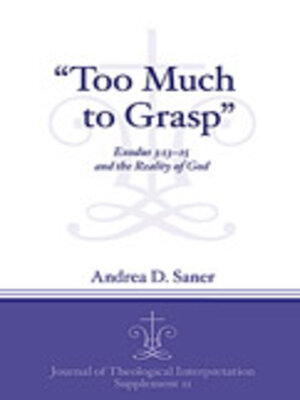"Too Much to Grasp"
ebook ∣ Exodus 3: 13–15 and the Reality of God · Journal of Theological Interpretation Supplements
By Andrea D. Saner

Sign up to save your library
With an OverDrive account, you can save your favorite libraries for at-a-glance information about availability. Find out more about OverDrive accounts.
Find this title in Libby, the library reading app by OverDrive.



Search for a digital library with this title
Title found at these libraries:
| Library Name | Distance |
|---|---|
| Loading... |
Few phrases in Scripture have occasioned as much discussion as has the "I am who I am" of Exodus 3:14. What does this phrase mean? How does it relate to the divine name, YHWH? Is it an answer to Moses' question (v. 13), or an evasion of an answer?
The trend in late-nineteenth- and twentieth-century scholarly interpretations of this verse was to superimpose later Christian interpretations, which built on Greek and Latin translations, on the Hebrew text. According to such views, the text presents an etymology of the divine name that suggests God's active presence with Israel or what God will accomplish for Israel; the text does not address the nature or being of God. However, this trend presents challenges to theological interpretation, which seeks to consider critically the value pre-modern Christian readings have for faithful appropriations of Scripture today.
In "Too Much to Grasp": Exodus 3:13?15 and the Reality of God, Andrea Saner argues for an alternative way forward for twenty-first century readings of the passage, using Augustine of Hippo as representative of the misunderstood interpretive tradition. Read within the literary contexts of the received form of the book of Exodus and the Pentateuch as a whole, the literal sense of Exodus 3:13–15 addresses both who God is as well as God's action. The "I am who I am" of v. 14a expresses indefiniteness; while God reveals himself as YHWH and offers this name for the Israelites to call upon him, God is not exhausted by this revelation but rather remains beyond human comprehension and control.







